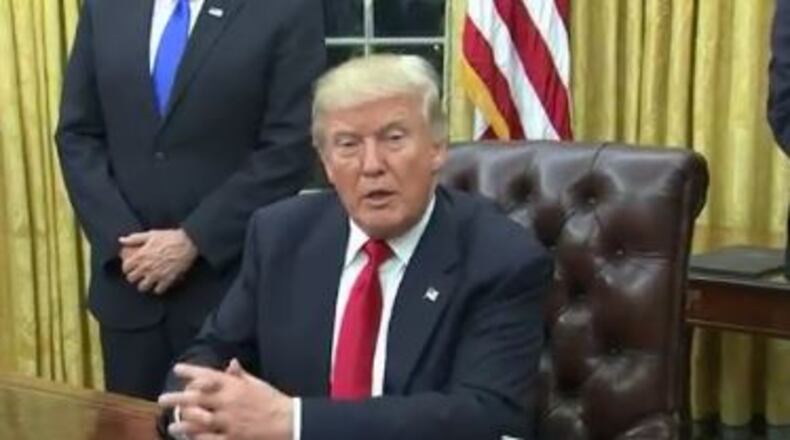Issuing his first executive order just hours after being sworn into office, President Donald Trump on Friday ordered federal agencies to ease "unwarranted economic and regulatory burdens" of Obamacare, as he again declared his desire to unravel his predecessor's main legislative achievement.
With Vice President Mike Pence, White House Chief of Staff Reince Priebus, and other top aides looking on in the Oval Office, President Trump signed a document that was very clear in its intent when it comes to the Obama health law - he wants it repealed - but in the meantime, he will ask federal officials to use their authority to make unilateral changes.
The executive order allows federal agencies to "waive, defer, grant exemptions from, or delay the implementation of any provision" dealing with Obamacare, if it imposes a "fiscal burden" - including the tax penalty that hits Americans who do not buy health insurance.
So what does it mean?
1. Use regulatory powers to get rid of Obamacare. While President Trump wants to repeal the Obama health law, he makes clear in this document that federal agencies should use the wide regulatory latitude in it to make changes in how the law operates, in order to "create a more free and open healthcare market." "President Trump's order signals that his administration will look to scale back the ACA where it can, not waiting for Congress," said Larry Levitt, a top official at the Kaiser Family Foundation, which specializes in health care matters.
aca11
2. What about the individual mandate? Section 2 of the executive order specifically talks about waiving and granting exemptions from among other things - a penalty - that would the tax penalty involved with the individual mandate. "Section 2 is the meat," said David Anderson of the Margolis Center for Health Policy at Duke University, who says the "HHS secretary has authority to issue hardship exemptions as s/he sees fit."
3. Selling health insurance across state lines. Republicans have long said there is no reason that health insurance should be regulated in a way that forbids insurance companies from offering policies that go across state lines. This executive order says federal agencies should "encourage the development of a free and open market in interstate commerce for the offering of healthcare services."
4. Fill in the blanks. As mentioned above, there are not many specifics in this executive order, which relies on broad regulatory authority for the Department of Health and Human Services and related agencies that have the power to enforce the Obama health law. Republicans have argued for years that the Obama Administration overstepped its legal authority on Obamacare; now they seem ready to make sure the same bureaucracy brings that law down.
5. Democrats were not pleased. Democrats had already been worried about what President Trump and Republicans would do, as this executive order quickly drew a big thumbs down from President Obama's party. Rep. Diana DeGette (D-CO) labeled it an "ominous start," saying the Trump move is "stoking anxiety" among those who get their coverage through the Affordable Care Act. But Democrats are no longer in power in the Executive Branch. Elections have consequences.
About the Author
The Latest
Featured



